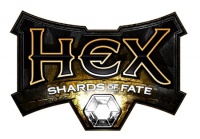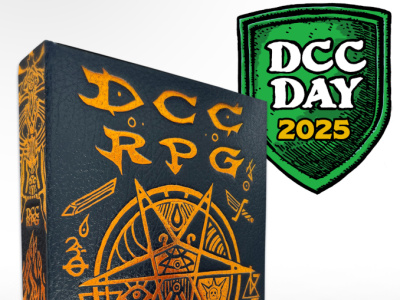 Rolling for Initiative is a weekly column by Scott Thorne, PhD, owner of Castle Perilous Games & Books in Carbondale, Illinois and instructor in marketing at Southeast Missouri State University. This week, Thorne looks at the Wizards of the Coast suit against Cryptozoic Entertainment.
Rolling for Initiative is a weekly column by Scott Thorne, PhD, owner of Castle Perilous Games & Books in Carbondale, Illinois and instructor in marketing at Southeast Missouri State University. This week, Thorne looks at the Wizards of the Coast suit against Cryptozoic Entertainment.As you may or may not have heard, in its second noteworthy legal action of the past year (the suit against Sweetpea Entertainment over the right to make a Dungeons & Dragons movie, see "WotC Sues," is still ongoing), Wizards of the Coast filed a lawsuit against Cryptozoic Entertainment and an affiliated company, Hex Entertainment, over the upcoming release of Hex’s Kickstarter-funded card game, Hex: Shards of Fate (see "WotC Sues Cryptozoic" for ICv2’s coverage from last Thursday). In its complaint, WOTC alleges that Hex violates Magic’s copyright, patent and trade dress, further saying the company attempted to negotiate with Cryptozoic over the matter last March but could not come to terms, ergo the lawsuit, in which WOTC seeks the following:
1. For a permanent injunction enjoining Cryptozoic and all persons acting in concert with them from manufacturing, producing, distributing, adapting, displaying, advertising, promoting, offering for sale and/or selling, or performing any materials that are substantially similar to Magic and to deliver to the Court for destruction or other reasonable disposition all materials and means for producing the same in Cryptozoic’s possession or control;
2. For a permanent injunction, enjoining Cryptozoic and all persons acting in concert with them from using the trade dress of Magic in connection with any paper, electronic, or web-based trading card video game or from otherwise using Wizards’ trade dress, as embodied in either of the paper or electronic forms of Magic or any confusingly similar use thereof, in any way causing the likelihood of confusion, deception, or mistake as to the source, nature, or quality of Cryptozoic’s games and to deliver to the Court for destruction or other reasonable disposition all materials bearing the infringing trade dress in Cryptozoic’s possession or control;
3. For any and all damages sustained by Wizards;
4. For all of Cryptozoic’s profits wrongfully derived from the infringement of Wizards’ intellectual property rights;
5. For a Judgment against Cryptozoic declaring this case to be exceptional under the Patent Act and therefore subjecting Cryptozoic to liability to include treble damages as authorized under Section 285 of the Patent Act;
6. For reasonable attorney’s fees;
7. For costs of suit herein; and
8. For other such relief as the Court deems proper
WOTC bases its lawsuit on its original patent for Magic, #5,662,332 issued in 1997 and the reissued patent #RE37,957, issued in 2003, with 25 independent claims for a card game that uses physical trading cards or a counter generated image as well as the means by which the game is played. In the lawsuit, WOTC cites a number of features of Magic that Hex allegedly duplicates, including: same number of starting Life points, same turn structure, same methods of winning, same starting hand size, same colors of cards, same levels of rarity, same booster pack distribution etc. In all I count 25 points of alleged duplication that WTOC cites in its complaint. WOTC also cites comments posted in the Cryptozoic forums comparing Hex to Magic as well as an extensive comparison between the two games on the "Threshold, the Hex Podcast" blog.
Patent law, one of the three areas upon which WOTC alleges Hex and Cryptozoic have infringed, has changed significantly over the past couple of decades, as the US Patent Office allowed the patenting of processes and concepts. For example, Apple has sought to patent the one-finger "pull down" motion used on iPhones and iPads to update on-screen material, while Amazon famously patented "one-click" shopping on its website. Even so, patent law is notoriously hard to interpret and, since WOTC has requested a jury trial, their lawyers will have to prove to a group that may be unfamiliar with Magic and the concept of trading card games that Hex violates the Magic patent. Should be interesting to watch but will likely move slowly, just like the Dungeons & Dragons lawsuit.
The opinions expressed in this column are solely those of the writer, and do not necessarily reflect the views of the editorial staff of ICv2.com.







